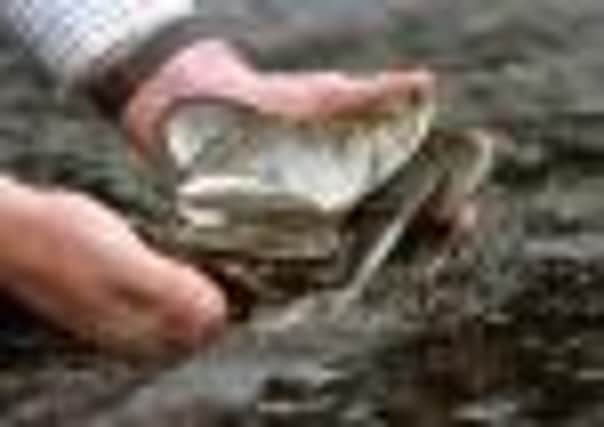End of the line for Scotland’s native pearl mussel


Ecologists working to reintroduce the endangered mussels have found the Scottish rivers and burns where the species once thrived are now strewn with loose boulders, which would smash the molluscs’ shells in high water.
None of the waterways assessed had been dredged or dammed, leading scientists to conclude that the changes are another unwelcome result of global warming, with heavier rains increasing the flow in small tributaries and disturbing riverbeds.
Advertisement
Hide AdAdvertisement
Hide AdThe loss of habitat is of serious concern given that half of the world population of the species is in Scotland.
The worrying findings were revealed at a Scottish Natural Heritage conference on conservation, marking the end of a five-year, £9 million action programme to help protect 32 species, including the mussels.
Dr Peter Cosgrove, principal ecologist at Moray environmental consultancy, Alba Ecology, said: “We were looking for possible sites for a reintroduction programme and – looked at more than 20 different rivers where pearl mussels thrived in the past, but in almost every one there was only a tiny patch of suitable habitat for the molluscs. The rivers were filled with boulders which would crush them.
“No-one has dammed or dredged them, or done anything else, and yet these rivers are now wholly unsuitable. If there is no suitable habitat we can’t reintroduce them. I think it is a sign that climate change is already happening now and is causing rivers to become unstable.”
The discovery is double blow for mussels because unstable rivers are no longer suitable habitat either for trout and salmon to spawn. They produce the young fish which mussel larvae must latch onto in their first year of life to survive before dropping off at new locations to grow and require gravel beds in slow moving water to lay their eggs.
Populations of both fish species are already in severe decline, putting mussels in even greater danger.
Global warming is the latest threat to pearl mussels, which were abundant in Scottish rivers for centuries until overfishing forced them to near extinction. The Romans are said to have plundered Scotland’s waterways for freshwater pearls, formed by the mollusc in response to irritation in its gut.
The earliest reference to Scottish pearls is understood to have been made in a letter dated 1120 to the then Bishop of St Andrews in which the writer, Nicholas, asked the cleric to obtain some pearls, if necessary from King Alexander I “who in this commodity, is richer than any man”. Pearls were subsequently exported across Europe.
Advertisement
Hide AdAdvertisement
Hide AdPearlfishing was banned in 1998 in a bid to save the species but illegal fishing continues to threaten its survival. In 2010, a survey suggested about 75 per cent of 21 internationally-important pearl mussel sites in Scotland had been criminally damaged.
Last year, Scotland’s pearl mussels were classified alongside China’s giant pandas and Javan rhinos as among the “most endangered species in the world”.
The Species on the Edge of Survival guide by the International Union for Conservation IUCN included mussels because of the combined threat of poaching and habitat loss.
Although many habitats are beyond natural repair, a £3.5 million project was launched earlier this year aimed at protecting surviving colonies in Scotland, England, and Wales.
The four-year project will centre around 21 British conservation sites and will involve a crackdown on wildlife crime, with riverwatch schemes helping to prevent the illegal exploitation of the mollusc.
The warning over the impact of climate change on mussels comes just days after European scientists forecast that Scotland’s fishing and farming industries could be radically changed by global warming in as little as ten years. A European Environment Agency report said extreme weather across Europe in recent years was expected to become increasingly intense and frequent.
Executive director Jacqueline McGlade said: “Increased rainfall and flooding in Scotland will cause more problems, like waterlogged fields [which destroyed root crops such as potatoes this summer] which might mean that within a decade farmers need to look at new varieties of key crops like barley, or at different crops altogether. Fishermen will also face challenges as waters warm and coldwater species like cod and pollock move north, potentially out of traditional fishing grounds, while new species like plaice move up from the south.”